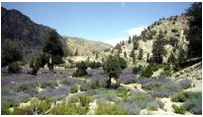i INP-WEALTHPK
Faiza Tehseen
A robust forest management information system (FMIS) is critical for increasing the forest cover in Balochistan, as the system can help collect exact data on deforestation, overgrazing, and the impact of climate change in the province.

"FMIS helps evolve strategies for forestation, conservation and the maintenance of sustainable natural resources,” said Muhammad Niaz Khan Kakar, Conservator Forests Quetta/Project Director – UPGG Wildlife and REDD+ expert. Talking to WealthPK, he said, “To increase and protect the existing forest cover, the provincial government is taking measures, including carrying out mega tree plantation programmes, strengthening the regulatory and forest policy mechanism, and implementing international mechanisms under the United Nations Framework Convention on Climate Change.”
He said that carbon stock was enhanced through the ‘reducing emissions from deforestation and forest degradation’ (REDD +) programme. “Balochistan is also part of the REDD+ initiatives under the project of ‘establishment of forest management information system’. The government of Balochistan’s forest and wildlife department undertook this study to assess forest cover, number of trees, biomass from trees, tree carbon stock, and the notified state forests of Ziarat.” Kakar said, “In the system, all the relevant data is linked with the FMIS dashboard.
For the said purpose, satellite imagery interpretation and sample-based terrestrial forest inventory supported through drone-tech are considered much reliable. According to the information derived through FMIS, the total notified state forests of Ziarat are found to be 264,925 hactares. The information says that 32.70% of the forest area is very dense, 33.94% dense, while 33.27% of the area is open forest cover.” Sharing some data collected through FMIS, he said that in terms of tree species, junipe covered 89.65% of the area, followed by olive 6.71% and shang 2.39%.
Other broadleaved species including Pistacia Khinjik, Dalbergia Sisso, Punica grantum, and Timirix spp, cover 1.25% of the area. Over 80% of the total forest-covered area is under pure juniper stands, 11.29% pure olive stands, 2.01% other broadleaved pure stands, 4.01% mixed juniper with broadleaved stands and 1.04% mixed broadleaved stands.” Kakar said, “The total number of trees in the notified state forests of Ziarat is 17.74 million (234 trees per hectare) with a maximum number of 8.16 million (46%) in the very dense forest area, 6.47 million (36%) in the dense forest, and 3.09 million in the open forest.
The total biomass (above ground and below ground pools) is estimated at 7.60 million TDM (total dry matter) with a weighted average density of 110.30 TDM per hectare. According to this information, 80% of biomass is above the ground and 20% is in the below ground pool. The highest biomass amount is present in the very dense forest – 4.65 million TDM (61%) followed by the dense forest 2.48 million TDM (33%) and the least in the open forest 0.468 million TDM (6%).”
The conservator forests Quetta said that the total carbon stock above and below ground biomass is estimated at 3.57 million TC (tonnes carbon) with a weighted average density of 47.14 TC per hectare. “About 80% of the carbon stock is above the ground while 20% is below ground pool. The highest carbon stock amount is present in the very dense forest – 2.187 million TC (61%), followed by the dense forest 1.165 million TC (33%) and the least in the open forest 0.357 million TC (6%).
The regeneration of juniper is inadequate, as only 22.76% of the forest area possess generation capacity, with an average of fewer than 55 plants per hectare.” “The described data is enough to prove the importance of FMIS as it supports proper planning to conserve the forests in Balocistan. Forest management information helps visualise forest assets, monitor the surrounding environment, and make informed decisions,” Kakar noted.
Talking to WealthPK, Muhammad Aatif Majeed, Deputy Director (Technical) of Pakistan Forest Institute, Peshawar, said, “FMIS is not just a technological advancement but a necessity for the sustainable future of forests in Balochistan. By bridging the gap between data and action, FMIS will pave the way for effective forest conservation and regeneration to ensure a greener and more resilient Balochistan. With the right investments and commitment, FMIS can widely transform the province’s landscape, benefiting the environment and generating livelihoods for people.”
Credit: INP-WealthPk









